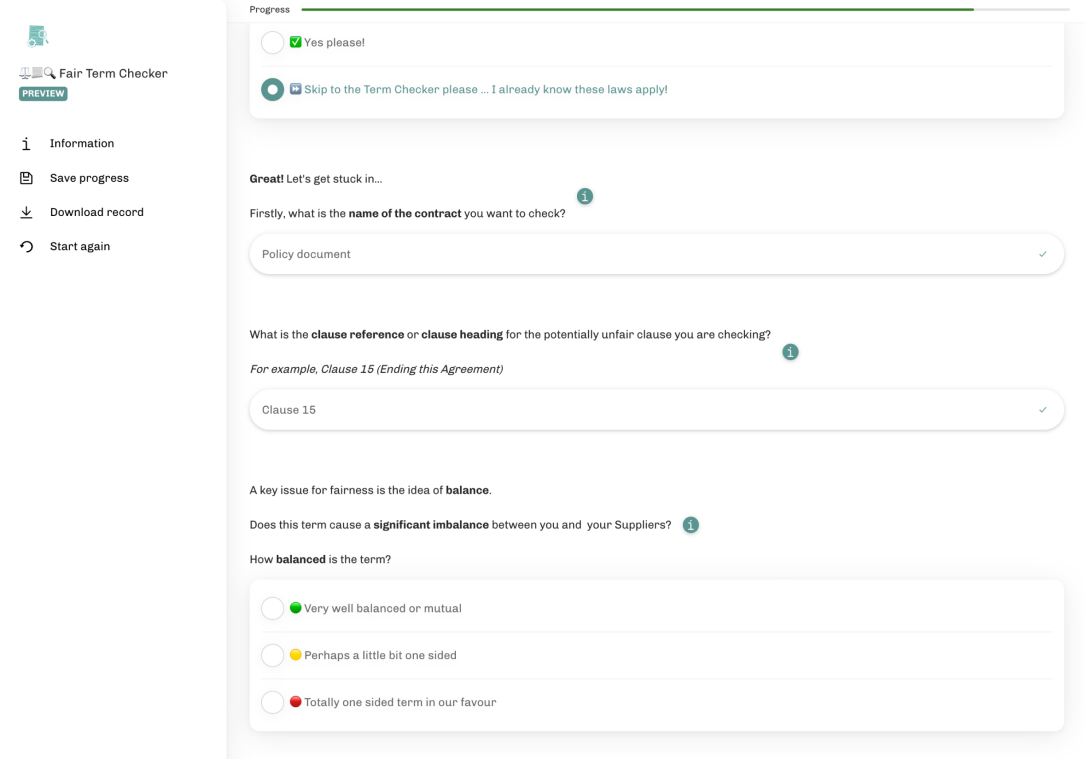“The Fair Term Checker allows in-house teams to assess their contract’s terms and keep track of how they performed the assessment.”– Verity White, Founder, Checklist Legal.
Checklist Legal’s new Fair Term Checker helps companies get their standardised contracts up to scratch
“The world is too complex to keep all this stuff in your brain. If you scale your brain with external tools, you’ll achieve higher quality outputs with better consistency.”
Compelling words from Checklist Legal’s Verity White whose latest bot, the Fair Term Checker, is primed to help companies navigate some potentially scary recent legislative changes to unfair contract terms regulations in Australia.
With the help of her new tool, Verity is doubling down on a mission to simplify contracts, increase accessibility to legal know-how, and ensure everyone stays ahead of the curve.

Verity White, Founder, Checklist Legal.
Hi Verity! For those unfamiliar with your work, could you share a little about what you do?
I’m a human-centred design practitioner certified through the LUMA Institute, a commercial law accredited specialist, and a Chief Contract Enthusiast at the B-Corp certified law firm Checklist Legal, which I built around redesigning contracts to make them easy to read and easy to automate.
Previously I’d worked in-house at a couple of telecommunications companies including Telstra. The more I developed professionally, the more I started investigating plain language contracts, which is how Checklist Legal was born. What started as a blog where I wrote about legal innovation, among other things, has now become a law firm where I’ve been working full-time for the past year.
You’ve built the Fair Term Checker which is very cool. We’ve been playing around with it and are curious how it came about. Can you tell us a little about the bot?
I can! Recently, there have been changes to some Australian laws, specifically around unfair contract terms under the Competition and Consumer Act.
Widespread changes are happening and what it means to be a small business has been completely re-defined. On top of that, unfair contract terms that would previously be considered void, are now to be considered illegal.
In real terms, this means that things that could previously be waived will now run the risk of generating multimillion-dollar penalties.
How does the Fair Term Checker help navigate all this?
There was little fanfare and few concrete examples of how to exactly assess whether a term is “unfair”. So, what I’ve done is embed into the Fair Term Checker a practical checklist that allows in-house teams to:
- assess their contract’s terms; and
- keep track of how they actually performed the assessment.
Users can also retain this data as their all-important “corporate memory”, which can be shared as and when required. Whether it’s upon request of executives, when teams change, or perhaps even when the regulator comes knocking.

Checklist Legal's Fair Term Checker in action!
What were your aims for the bot?
A few things:
- Firstly, education. I wanted it to help inform users whether or not certain terms apply to any given contract.
- Secondly, I wanted the tool to be user-friendly so that people can make assessments in simple, easy ways.
- Thirdly, it wanted it to generate a report that tracks exactly what the user has checked. The report would provide guidance for later and provide an assessment score to ensure everything is digestible.
We’ve had a play ourselves and would encourage everyone to interact with the bot and download a report! Can you expand on why you built the Fair Term Checker?
Assessing a contract or new legal requirement is usually manual work performed by one person, creating unnecessary silos of information. I thought, why not scale your brain with external tools like this?
I’m an avid lover of checklists and believe that when implemented correctly, checklists increase outcomes and produce higher-quality outputs with better consistency.
That’s why surgeons use checklists. It’s why they use them in planes, space missions, and so on.
The world is way too complex to hold all the information in your brain, so if you think you can deliver legal services without the help of external tools, you’re kidding yourself and doing both yourself and your clients a disservice.
How can tools like yours help clients or the public at large?
While the Fair Term Checker is primarily built for lawyers, a way to maximise the utility of similar tools would be to prioritise accessibility.
Clients of all types should be able to fully interact with their whole suite of rights and it’s often the case that lawyers draft contracts as if everyone will have a lawyer to help with interpretation. This is often not the case and is an unreasonable expectation.
Therefore, if you’re building tools similar to mine, ensure they’re educational in design. If you do, you’ll help more people understand legal issues and make your work life generally much easier down the track.
Agreed, accessibility is key. Okay, last question: what one piece of advice would you pass on to those looking to go down a career pathway similar to yours?
I have two!
One, play around. Play with all the free apps and plugins available to you so you can get a better understanding of how to automate. This’ll help you change your mindset and approach to contracts.
Secondly, process mapping is a lot of fun. Map out your service design as this is really important and it’ll help you in droves when redesigning documents and contracts.
Play and process, the two Ps! That’s great. Thanks so much, Verity.
Thank you too!
Want to learn more?
To learn how to make your contracts beautiful, read Verity’s top three tips here.